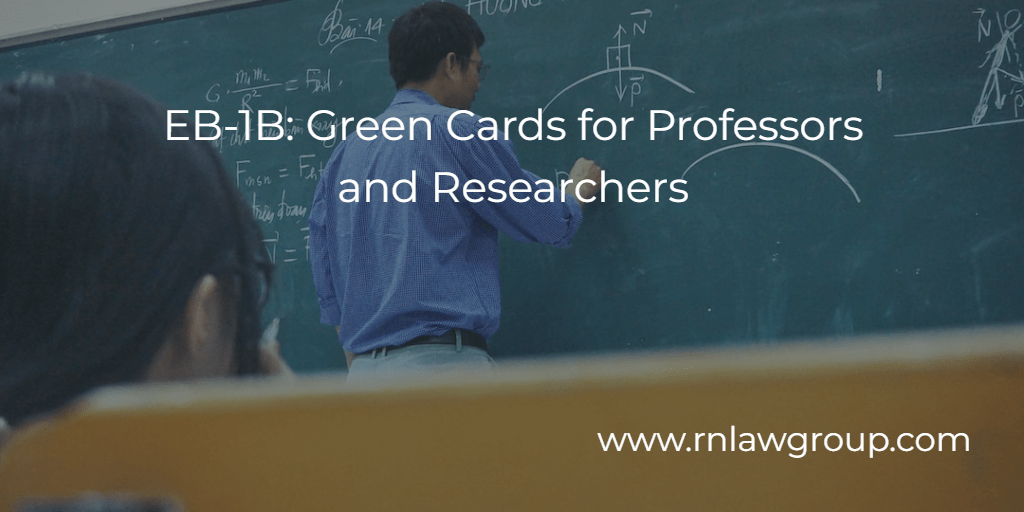
EB-1B: Green Cards for Professors and Researchers
Among the various avenues for permanent residency in the United States, the EB-1B Outstanding Professor/Researcher Green Card category is a coveted immigration option for outstanding foreign professors and researchers in any recognizable academic field. While these petitions are not self-petitioned like EB-1A Extraordinary Ability or EB-2 National Interest Waiver (NIW), one key benefit of the EB-1B scheme is that it allows the sponsoring employer to forego the lengthy and expensive Labor Certification process. Additionally, the EB-1A green card backlog tends to be far less burdensome than the EB-2 queue. Therefore, the EB-1B green card path helps US employers expedite the Green Card journey for its sponsored employees.
It is important to note that a variety of entities in the United States can sponsor EB-1B Outstanding Professor/Researcher Green Card cases. The diverse range of sponsoring entities reflects the inclusive nature of the EB-1B category, acknowledging excellence across different sectors and institutions. For instance, private companies with research institutions and functions, have the authority to sponsor individuals holding exceptional positions both in academia or private research. Likewise, universities and academic institutions, both private and public, are common sponsors for EB-1B candidates. Nonprofit research organizations, such as independent research institutions and think tanks, can play a leading and beneficial role in sponsoring EB-1B cases. Research organizations, spanning federal, state, or local agencies, are eligible sponsors capable of initiating EB-1B petitions for outstanding professors and researchers in various fields.
To develop a successful EB-1B case, we would likely need to take a two-step approach. First, we must make sure the petitioning or sponsoring employer qualifies to sponsor an individual (i.e. qualifying status of employer; “QSE”) and can provide an appropriate qualifying offer of employer (“QOE”).
For QSE, the sponsoring employer must showcase a robust research infrastructure by having at least three individuals in research positions. Demonstrating this can be achieved through a combination of detailed CVs, employment verification letters, and payroll records. Establishing the company’s success in the academic research field is equally vital. This involves defining the company’s research activities, presenting a track record of achievements and growth, showcasing documented use cases, and providing testimonials from clients and academic collaborators.
The QOE, on the other hand, necessitates a standard job offer letter but with specific criteria. It should state the permanency of the research position, its indefinite nature, and the ordinary expectation of continued employment, barring good cause termination.
Once we’ve established the petitioning or sponsoring employer is entitled to file EB-1B petitions on behalf of outstanding professors or researchers, we must then verify that the sponsored employee (i.e. the sponsored professor or researcher) qualifies as “outstanding” pursuant to USCIS’ applicable statutes and regulations.
On the individual’s side, the focus shifts to defining the identified candidate’s academic area of research, providing documentation of their “outstanding” abilities, and showcasing the international reputation of their research or within their area of academia. This typically involves compiling reference letters and statutory evidence to support the claim of being an outstanding researcher. Generally speaking, we would need to provide experience letters demonstrating a minimum of three years in a research position are crucial. Additionally, and often of most importance these EB-1B petitions should be accompanied by at least 2-6 reference letters from former colleagues, research partners, or independent academics speaking to the impact of the research and the sponsored academic’s international renown. These letters should attest to the individual’s international recognition as an outstanding academic.
Additionally, the USCIS requires evidence of meeting at least two out of six specific statutory criteria. These include the 1) receipt of major awards or prizes in the area of research or academic excellence, 2) documentation one has been invited to judge the work of others in a peer-reviewed context, 3) documentation of original, significant research or contributions, 4) documentation of authorship of books or articles in scholarly journals, 5) membership in associations which require outstanding achievement from its members, and 6) having material published about the individual in major media or professional publications. Leveraging the individual’s achievements, such as awards, peer reviews, original research contributions, and authorship in scholarly journals, is pivotal to meeting these criteria.
To achieve immigration success, we must recognize that creative and effective navigation of the EB-1B Green Card application involves strategic documentation that be used to meet multiple as detailed above. For instance, evidence of original research contributions, as required under one criterion, can be leveraged to substantiate achievements in other areas. A comprehensive Google Scholar profile showcasing authored articles in scholarly journals not only satisfies one criterion but also attests to the individual’s significant research output, reinforcing the case for outstanding contributions. Moreover, reference letters from colleagues and research partners, crafted to speak to the researcher’s international recognition, can be instrumental across multiple criteria. These letters can provide insights into the significance of original research, the impact of published articles, and the individual’s role in judging the work of others. By strategically repurposing and cross-referencing documentation, sponsoring employers can present a robust and cohesive case, demonstrating their eligibility across various EB-1B criteria and strengthening their chances of securing this esteemed green card status.
For more information, or for a detailed conversation regarding your specific employment-based immigration background and qualifications or other any potential issues arising during your Permanent Residency Process or Green Card process, please schedule a time to speak here.
By Ryan A. Wilck, Partner and Attorney at Law
Ryan Wilck is a Managing Partner and attorney at Reddy Neumann Brown PC with over a decade of US immigration law experience, enthusiastic and proactive in his approach assisting clients and their employees through the various phases of the permanent residency a/k/a Green Card process. “Concilio et labore” is not only the motto of Ryan’s favorite sports club but is also his life’s motto; all things come through wisdom and effort. Ryan is passionate about gaining the trust of his clients by utilizing a relentless and detail-oriented approach to understand their specific goals and concerns, hoping to instill a sense of confidence and stability. Whatever your immigration problem or interest, he and his team will find a solution, through wisdom and effort. Reddy Neumann Brown PC has been serving the business community for over 20 years and is Houston’s largest immigration law firm focused solely on employment-based business immigration. We work with employers and their employees, helping navigate the complex immigration process efficiently and cost-effective.
We are committed to assisting our clients with navigating the complex PERM Labor Certification (ETA 9089 and other challenging immigration matters as an accomplished immigration law firm in Houston, Texas. Our team is here to offer the direction and support you require, whether you’re a company trying to hire top talent or a foreign worker seeking to develop a career in the United States. To find out more about how we can help you with your immigration issues, get in touch with us right away.

